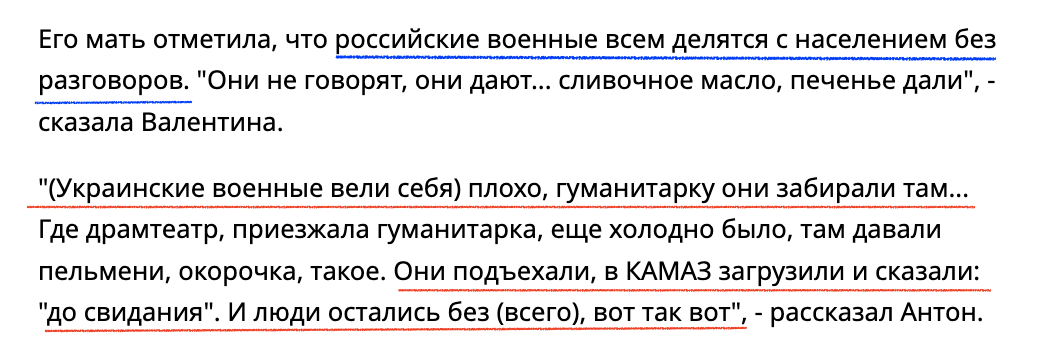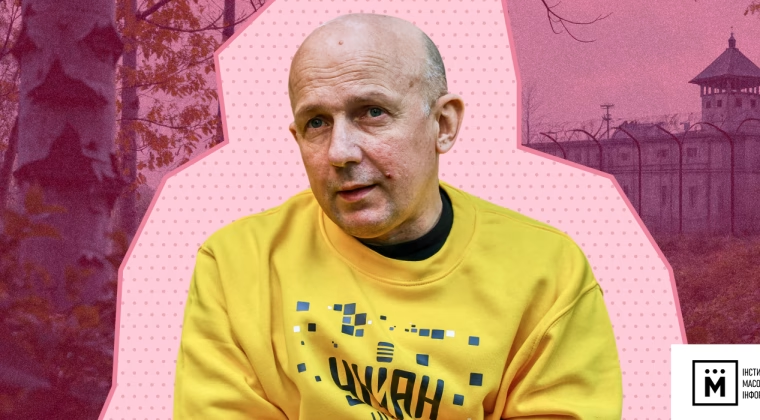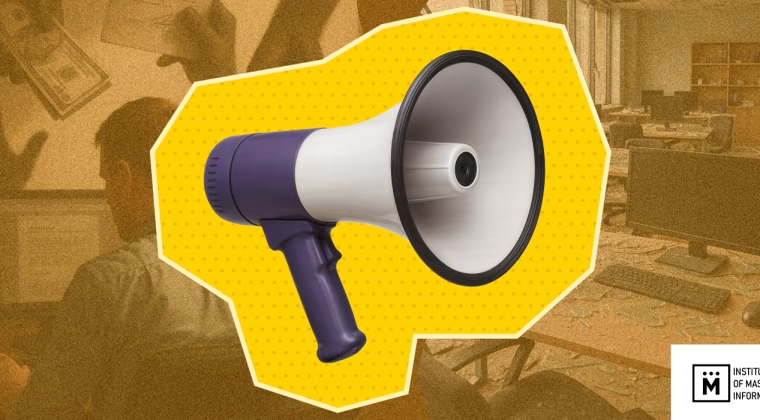Before the full-scale invasion of Ukraine, the russian media wrote about Ukraine’s four main problems: nationalists, Zelenskyy, Ukrainian politicians, and partly Poroshenko. Zelenskyy – because he is unable to deal with the nationalists, nationalists – because they interfere with Zelenskyy’s work, Ukrainian politicians – because they only know how to beat one another and “correspond with prostitutes,” and Poroshenko – well, that one is an old sin of Ukrainians.
As of today, Ukraine is a key topic in the russian media, but the narratives have changed dramatically. Even during the celebration of “russia day,” kremlin mouthpieces were devoting the lion’s share of their reports to the discreditation Ukraine and its Western partners supporting it in the war. Maybe that is because their own country does not give them much to be proud of.
During the monitoring period, the most mentions of Ukraine and its territory were made by: “RIA” 49%, “Lenta” and “Izvestia” 17% each, “Komsomolskaya Pravda” 12%, and “RBK” has written about Ukraine the least often – 5% of the total number of articles included in the sample.*
IMI experts noted that the most popular Ukraine-related narrative in the russian media had to do with discrediting the Ukrainian army. This topic constituted 40% of the total number of articles included in the sample during the monitoring period.
russian propaganda reports about the “loser UAF” who randomly fire on the civilian population of the Donbas served as an informational pretext for reinforcing the narratives that discredit the Armed Forces. The reports about “firing on civilians” are designed in such a way as to evoke disgust and hatred towards the Armed Forces in the audience. “Civillian victims,” for example, are mentioned in the headlines:
- Civillian woman wounded as the UAF shells Petrovsky district of Donetsk
- Civillian woman wounded by the UAF’s shelling of Kreminna
- Civillian killed in the shelling of Kirovsky district of Donetsk by the UAF
- Shelling attack on Kirovsky district of Donetsk wounds five civillians
An interesting trend noticed by IMI experts during the monitoring is that the propagandists use replacement of words and concepts in their media. For example, if the report is about the temporarily occupied territory of Ukraine or the russian territory, then the word “explosion” is replaced by “pop.” Such techniques are designed to conceal and not spread panic among the population, as well as to create the impression that the authorities have everything under control. Explosions in the temporarily occupied territory of Ukraine are also called “terrorist attacks” in the russian media. And, of course, the Armed Forces are being blamed for causing injuries and deaths of civilians due to their activities.
- Zaporizhzhia region authorities call the explosion at the substation a terrorist attack
- Four people wounded by a terrorist attack in Melitopol
- Member of Zaporizhzhia regional administration blames the UAF for the terrorist attack in Melitopol
- Ukrainian militants commit a terrorist attack near the police building in Melitopol
- Zaporizhzhia region law enforcement authorities call the June 12 explosion in Berdyansk a terrorist attack
- Berdyansk under terrorist attack
The propagandists have not reached an agrement on what to call the people whom they are blaming for the “terrorist attacks” yet. The terminology used by kremlin mouthpieces is reminiscent of old Soviet propaganda:
However, in one article about a “terrorist attack,” the russian media mentions that these attacks are designed by the Ukrainian special services and aimed against the civilian population. That is, the picture painted by the propagandists works to discredit the image of the Ukrainian defenders. As if the Armed Forces of Ukraine are using all their military force and weapons against the civilian population, which only the russian army can save: “This terrorist attack, like the terrorist attack in Melitopol, indicates that the work of the Ukrainian special services against the civilian population of Zaporizhzhia region has intensified. The purpose of the Ukrainian special services’ work is to make people scared through blood and terror. We will put up a worthy resistance to these attempts.”
In addition to the shelling of civilians, russian propagandists have been writing reports about how the people defending Ukraine in the ranks of the Ukrainian Armed Forces and Territorial Defense Forces are drug addicts and alcoholics. They framed this information as coming from a POW, that is, one can already draw conclusions about the reliability of it. Having power and superiority over the prisoner, the russians can forcefully beat any text and any confession that propaganda needs out of them:
- Ukrainian soldiers barter grenades for drugs, imprisoned UAF militant says
- Ukrainian military tells the story of his fellow soldier firing at his own people
- UAF 92nd brigade soldier speaks about the Ukrainian military bartering grenades for drugs
- Prisoner of war speaks about the grenades for drugs barter among Ukrainian soldiers
As for the discrediting of the TDF soldiers, the russian media portray the group as “cannon fodder” and fighters with “outdated weapons that have long been out of use and cannot even be reloaded.”
During the monitoring period, we noted a story where propagandists filmed a man who had allegedly served in the TDF and came to “surrender” voluntarily. However, it is interesting that right as the man was walking towards the terrorists’ building, a group of propagandist journalists appeared, filming this process from different angles like it is a documentary.
Other reports involve a military expert who sends the message that the TDF fighters are “cannon fodder” for Ukrainians:
- New UAF tactic involving Territorial Defense units in the Donbas exposed
- Military expert explains Zelenskyy’s decision to send the Territorial Defense units to the front line
In fact, to paint the narrative about the unbearable, full of discrimination life of the UAF soldiers for the audience, the Ombudswoman of the russian federation Moskalkova stated that “I am receiving new appeals from Ukrainian mothers. They are asking not to send their sons back, because they believe that they will either be sent to the front line again or subjected to repressions:”
- Ukrainian POWs’ relatives’ requests to not send them back home become known
- Families of Ukrainian POWs ask not to send them back, Moskalkova says
- Moskalkova claims that relatives of Ukrainian POWs are asking her not to send them back home
The image of the UAF in the russian media is being discredited through the following narratives:
- the soldiers fire on the civilian population and carry out terrorist attacks against the civilian population
- UAF are drug addicts and alcoholics
- TDF fighters are simply “cannon fodder” who are not prepared for the war
- the fighters who were captured by the russians want to stay and live in russia, because in Ukraine, a trip back to the front line awaits them
- soldiers of the Armed Forces forcefully take food from the civilian population, while the russian army feeds the residents of the occupied territories
The next narrative is about the powerful russian army and the potential of the so-called “ldnr” army which is fighting against “nationalists” and “weapons from the West” (21% of the content included in the sample).
The russians are calling such acts of fighting not a war, but “denazification” and “demilitarization.” The army of the russian federation is portrayed as honest, open to the civilian population, as the ones who came here in peace and want to help the “ldnr” fighters.
- Russian air defense systems strike down a Ukrainian SU-25 in Kharkiv region
- Since the beginning of the special operation, Russian Armed Forces have eliminated 1188 Ukrainian UAVs
- Video of DNR artillery destroying the UAF positions near Horlivka has been published
- Ministry of Defense reports the Russian military’s new heroic feats in the course of the special operation
However, the russian army is not fighting Ukrainian nationalists alone, they are assisted by the “powerful ldnr army:”
- LNR forces are fighting the Ukrainian military holed up in Severodonetsk
- LNR people’s militia evacuates around fifty civillians from the combat zone
- LNR forces take two settlements under control
To consolidate the narrative about the powerful armies of the russian federation and the “ldnr,” the propagandists add testimonies from “eyewitnesses.” These reports reinforce the “liberation of the Donbas” narratives targeted towards russians. In their materials, russian propagandists cite alleged local residents and boast of “victories” about the “liberation of Severodonetsk,” the battle for which was, in fact, still ongoing at the time.
- Severodonetsk residents say that the UAF had been parking their military equipment in the residential districts
- Severodonetsk resident speaks about the UAF treatment of civillians
To contrast the horrible and aggressive “UAF nationalists,” the russian media publish content about the wonderful soldiers of the russian federation who are helping the local people. Severodonetsk residents speak about the help they received from the Russian military.
However, what else can you expect when the ones speaking are hungry local residents whose city has been occupied. And the only way to survive and get “butter and cookies” is to say whatever the occupiers want to hear.

The next most popular is the narrative about the occupied territories coming back to life (18% of the content included in the sample). The russians are very active in declaring and demonstrating that life in the occupied territories is being restored after the “consequences of the shelling by the UAF,” that the occupiers have managed to put things right. Propagandists even dare to say that citizens can expect a wonderful life in a functional city:
- The work of Mariupol port will be fully restored in three weeks, Pushilin says
- Mariupol Theatre to be opened an September 10
- Pushilin: you can now find a job according to your profession in Mariupol
- Quadcopter records the demining of a Mariupol beach on video
- DNR authorities plan to hold school year opening ceremonies on September 1 in all schools
The atmosphere of the “russian pseudo-restoration” is also promoted in articles about the temporarily occupied territories of southern Ukraine. The propagandists have stated that Ukrainian children will have the option of learning the Ukrainian language, despite the fact that the curriculum will be in russian. The russians argue that “…we share the same language roots, so I don’t think there will be any obvious problems. Of course, we will provide an opportunity to learn the russian language, but I believe that it is necessary to keep the Ukrainian language as a subject in schools – this is done in all the national republics. In russia, you can always learn the national language in all republics. This is a gradual issue, there are some respective methods, and I don’t think there will be any problems here.”
- Schools of Zaporizhzhia region will work according to Russian standards
- Children in Zaporizhzhia region will learn Ukrainian and Russian, Kravtsov says
For the sake of credibility and recognition, the propagandists have staged a story where a woman who is allegedly a journalist from Japan “is surprised that it is actually working in full order.” This technique is used by the russians to show that foreigners recognize and respect how well the “dnr” is working and rebuilding the destroyed Mariupol.
To complement the picture of rebirth and wonderful happy life, the russians dragged mercenary nobodies “russian performers” with a one-song repertoire to the temporarily occupied territories.
To cover up the fact that the people of Kherson did not come to the russians’ concert, propagandists have decided to explain the situation by saying that “…there are a lot of us – of people who believe in russia. Many are staying at home, many are still afraid of provocations and terrorist attacks.“
russian ropagandist Kirienko has said some nonsense about the “russian Donbas,” at the same time encouraging positive thinking with his speech about how “any crisis is an opportunity.”
Therefore, according to the propagandist, “for the people of in the Donbas, who for eight years have been defending their right to choose their own destiny, their right to be russian – russian not only in the sense of nationality, but russian in the sense of a cultural choice, to speak russian, read books in russian, educate your children in the russian culture and the traditions of our great nation – you have showed what it means to stand for your right to make your own choice better than anyone else.”
In addition, russian media have been posting news about Europe and the USA suffering because of their aid to Ukraine. Discrediting messages about Europe and the USA have been presented in the context of Ukraine. Experts have recorded 7% of such content in the sample.
- Spain has to apologize for their plan to deliver German tanks to Kyiv
- Biden calls the growing gas prices in the US a side effect of aiding Kyiv
The narrative about how “Ukraine should cede the occupied territories to the russians in order to end the war” was also popular (4% of the content included in the sample):
- Stoltenberg supposes that Kyiv will have to agree to territorial concessions
- American diplomat speaks about Zelenskyy’s hint on a Crimea compromise
- Diplomat Haas: Zelenskyy hints at his idea to withdraw claims for the Russian Crimea
- Italy points out the necessity of ceding territory to Russia
Through such materials, the russians are pushing the narrative of russia’s readiness for peace and negotiations. However, according to the propagandists, the Ukrainian authorities are in no hurry to join the peacemaking effort and end the war.
* This content research was conducted in June 2022 based on the five most popular russian online media: TASS, Komsomolskaya Pravda, Lenta.Ru, Izvestiya, RBK. The sample consisted of 275 reports from these websites.



